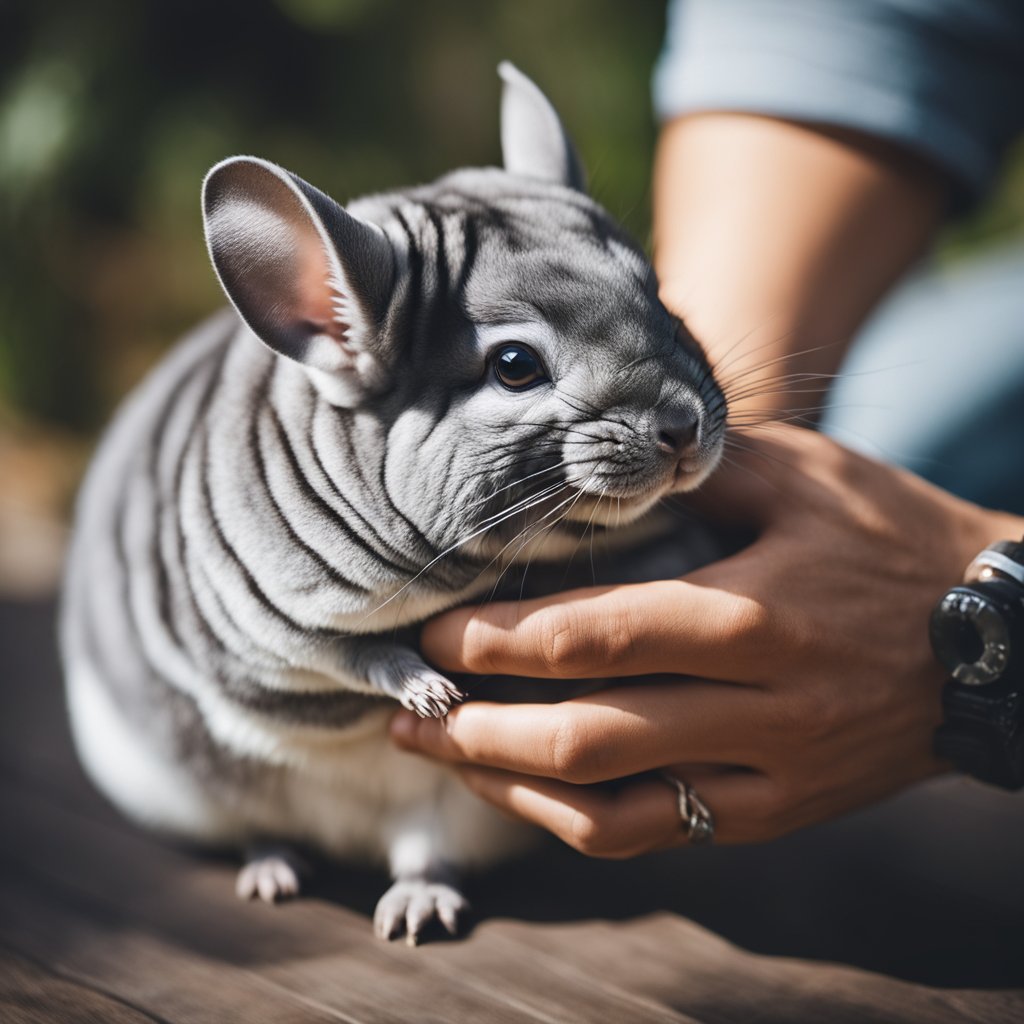Chinchillas are known for their soft, plush fur and playful nature. Many people wonder about their capacity for affection. Chinchillas can be affectionate pets, but they may not express it in the same way as dogs or cats. Instead of seeking constant cuddling, they show their affection through trust and companionship.

As you build a bond with your chinchilla, you will notice unique behaviors that indicate their feelings towards you. They enjoy social interactions and can form strong connections with their owners. Understanding their needs and personalities is essential for fostering a loving relationship.
If you’re considering bringing a chinchilla into your life, knowing how to approach their care and socialization can enhance your experience. With some patience and love, your chinchilla can become a wonderful companion who shows its affection in special ways.
Key Takeaways
- Chinchillas show affection through trust rather than cuddling.
- Building a bond requires patience and understanding their behavior.
- Proper care contributes to a loving relationship with your chinchilla.
Chinchilla Behavior and Affection

Chinchillas are known for their unique behaviors and affectionate nature. Understanding their temperament and recognizing signs of affection can help strengthen your bond with your pet.
Understanding Chinchilla Temperament
Chinchillas have distinct personalities. They are generally curious, social, and playful animals. They thrive in environments where they feel safe and secure.
These small creatures require patience as they can be skittish, especially around new people or situations. It’s important to create a calm atmosphere to help them adjust.
Bonding takes time, so allow your chinchilla to explore and get used to you at their own pace. This helps build trust, which is essential for a healthy relationship.
Signs of Affection in Chinchillas
Chinchillas show affection in various ways. Here are some common signs:
- Greeting You: If your chinchilla approaches the front of the cage when you enter a room, it’s a good sign they recognize you.
- Climbing and Jumping: Your chinchilla may jump and climb on you, indicating comfort and curiosity.
- Vocalizations: Soft squeaks and chirps can show happiness and attachment.
- Licking: This behavior, similar to grooming, shows trust and bond.
- Enjoying Pets: If your chinchilla leans into your hand for petting, it means they appreciate your touch.
Bonding with Your Chinchilla
To bond effectively with your chinchilla, start by spending quality time together. Sitting near their cage can help them get used to your presence.
Use treats to build trust. Offer them your hand or a treat while sitting quietly to encourage interaction.
Patience is key. Every chinchilla is different, and some may take longer than others to warm up. Be consistent in your approach, and respect their comfort levels.
Creating a positive environment will lead to a rewarding relationship with your chinchilla.
Caring for Your Chinchilla

Caring for your chinchilla involves creating a comfortable space, ensuring proper health and nutrition, and fostering positive social interactions. Each aspect plays a crucial role in your chinchilla’s well-being and affection towards you.
Creating a Comfortable Living Environment
To provide a suitable habitat for your chinchilla, choose a spacious cage made from metal or durable materials. The cage should have multiple levels and plenty of room to move.
Important features include:
- Solid flooring: Avoid wire floors, as they can hurt your chinchilla’s feet.
- Bedding: Use safe bedding like aspen shavings or paper-based products. Avoid cedar or pine shavings.
- Hideaways: Include hiding spots, such as tunnels and wooden houses, to help your chinchilla feel secure.
Keep the cage away from direct sunlight and drafts. Chinchillas thrive in cooler temperatures, ideally between 60°F and 70°F.
Health and Nutrition
A balanced diet is essential for your chinchilla’s health. The primary food should be high-quality hay, like timothy hay, which aids digestion and provides essential fiber.
Supplement their diet with:
- Pellets: Choose a fortified chinchilla pellet for added nutrients.
- Fresh treats: Offer small amounts of safe vegetables or fruits like carrots or apple slices.
Keep an eye on their water supply. Fresh, clean water should always be available. Regular vet check-ups are also key to spotting health issues early.
Handling and Socialization
Building trust with your chinchilla is vital for a strong bond. Start by spending time near their cage, allowing them to get used to your presence.
When handling your chinchilla, follow these tips:
- Gentle approach: Move slowly to avoid startling them.
- Support their body: Always support their hind legs when you hold them.
- Respect their space: Not all chinchillas enjoy being held. Pay attention to their reactions.
Engage with your chinchilla daily to enhance socialization. Positive interactions, like gentle petting and playtime, will help build a friendly relationship.
Resources

Here are some resources to help you understand more about the affectionate nature of chinchillas. These articles cover various aspects of their behavior and how you can bond with them.
- Learn how chinchillas show affection by visiting Chinchilla Friend. This article highlights signs that indicate a happy and affectionate chinchilla.
- If you want to discover their temperament, check out Chinchilla Guru. It details how chinchillas bond with their owners and other chinchillas.
- For a balanced view, explore the pros and cons of owning a chinchilla on Planet Chinchilla. This includes their cleanliness, low maintenance, and affectionate nature.
- To find more ways to create a loving environment, refer to Planet Chinchilla – Affection. This resource discusses the various ways chinchillas express affection towards you.
- Lastly, visit Pets HUN to read about the affectionate nature of chinchillas. It includes tips on building trust and love with your pet.
These resources will enhance your knowledge and help you nurture your relationship with your chinchilla.
Frequently Asked Questions

You may have questions about how chinchillas show affection and their behavior toward you. This section addresses common inquiries regarding their social habits, expressions of fondness, and overall compatibility as pets.
What behaviors indicate that a chinchilla is affectionate?
Chinchillas often display their affection through various behaviors. They may greet you at the front of their cage when you enter the room. Other signs include hopping onto your shoulder and making soft squeaks or purring noises while being close to you.
Are chinchillas known to develop attachment to their human companions?
Yes, chinchillas can develop strong attachments to their human companions. With time and consistent interaction, they learn to trust you. This bond allows them to show affection more freely.
How do chinchillas typically express their fondness for their owners?
Chinchillas express their fondness in several ways. They might lick your hands and feet or cuddle close to you. Enjoying pets and scratches are also strong indicators of their affection.
Is it common for chinchillas to enjoy physical contact, such as being held or cuddled?
Chinchillas may enjoy gentle physical contact once they are familiar with you. While some chinchillas tolerate being held, others prefer to stay on the ground. It’s essential to gauge your chinchilla’s comfort level with handling.
Do chinchillas prefer living with other chinchillas or alone?
Chinchillas are social animals that often thrive in pairs or small groups. Living with other chinchillas can provide them with companionship and reduce stress. While some can adapt to being alone, having a buddy is generally best for their well-being.
Can chinchillas make suitable pets for individuals who are new to pet ownership?
Chinchillas can be good pets for new owners if you are willing to learn about their care. They require specific environments and diets to thrive. Being patient and understanding their needs will help you build a strong relationship with your chinchilla.

